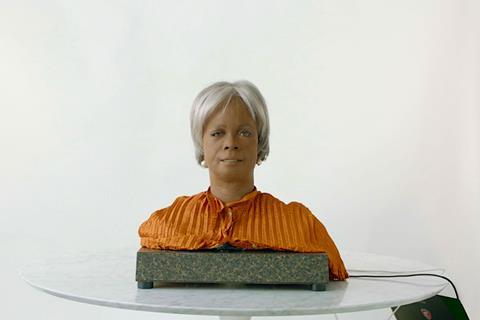An American couple attempts to cheat death through artificial intelligence in this eye-opening doc

Dir: Peter Sillen. US. 2024. 96mins
An American couple’s drive to preserve their eternal love through the use of cutting edge artificial intelligence and robotics ends up becoming the catalyst for future-changing technology in this timely documetary which opens Sundance’s US documentary competition. Unlike many other works around this subject, cinematographer-turned-filmmaker Peter Sillen focuses on the positive opportunities that AI represents — this is more Tomorrow’s World than Terminator — and that upbeat, accessible tone should see the film travel after its Sundance premiere.
Makes a persuasive argument that, one day, death may well be optional
Sillen began filming in 2017, before the recent explosion in AI technologies, but Martine and Bina Rothblatt have been working on this project since the early 2000s. Partnered for over 40 years, their determination to see their intense love endure post-death has resulted in Bina48; a robotic head which looks like Bina and is fuelled by ‘mindfiles’ — decades of interviews with Bina and Martine, who transitioned during their long marriage, that are programmed into the robot ‘brain’ using proprietary AI technology created by Matt Stevenson.
Initial results are fairly rudimentary by today’s standards; Bina48’s movements and speech are jerky, her responses seem more like stock phrases than natural conversation. But, still, she marks a watershed moment in the development of AI, and becomes a media phenomenon and a key educational tool. As time moves on — and, tellingly when the team begins to meld their software with open-door large language models — Bina48 seems to grow more intelligent, responsive, humorous, even self-aware. And she becomes an inspiration; the Tarsem Movement Foundation, co-founded by the Rothblatts and Bruce Duncan, now has devoted followers who are uploading their own mind maps and offering DNA samples, in preparation for a time when AI and humanity can be seamlessly melded.
Perhaps even more fascinating than Bina48 are the Rothblatts themselves, who have spent their lives in the pursuit of incredible goals. In the 1980’s, Martine became a pioneer of satellite communications, founding Sirius Satellite Radio. When the couple’s young daughter was diagnosed with pulmonary hypertension in 1994, they moved into medical research and created United Therapeutics, developing life-saving medicine and technological advancements including genetically modified and 3D printed organs. And, as a transgender woman, Martine has — with the support of Bina — been an advocate for trans rights since the 1990s, when her views on the fluidity of gender made her a pilloried outlier.
It is ironic, then, that Martine’s conventionally successful entrepreneurial background has given the couple both the resources and platform they need to achieve such incredible things. Over the course of the film, Sillen pulls in archive footage of and interviews with other big thinkers: David Hanson, the founder of Hanson Robotics; Gerard Kitchen O’Neill, a space activist who foresaw humans living in giant habitats orbiting earth; Ray Kurzweil; a director of engineering at Google who is resolute that by 2029, AI will match human beings in every area (the so-called ‘singularity’).
It does not go unnoticed that most of these pioneers are white men, and the film does sound a cautionary note about the possibility that AI algorithms will simply reflect the biases of their relatively small group of creators. Duncan promises that, in future upgrades, Bina48 will learn about prejudice and bigotry — a necessary step for this still-infant technology, even though the original Bina, a Black woman, is so clearly and eloquently against all of these things.
Yet Love Machina largely skirts such cultural and philosophical quagmires, and fully embraces the Rothblatt’s belief that, used correctly, AI will be an important tool for the future of a connected humankind. While whimsical soundtrack choices — including ’Calling Occupants Of Interplanetary Craft’ by Klaata and ’Biological Speculation’ by The Delfonics — bring a playful tone, the film takes its subjects seriously and, like them, makes a persuasive argument that, one day, death may well be optional.
Production company: C41 Media
International sales: CAA filmsales@caa.com
Producer: Brendan Doyle
Cinematograpy: Peter Sillen
Editing: Conor McBride
Music: T Griffin























No comments yet